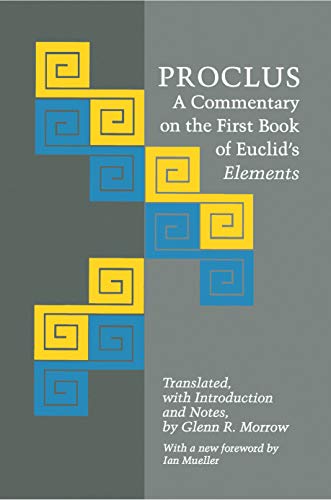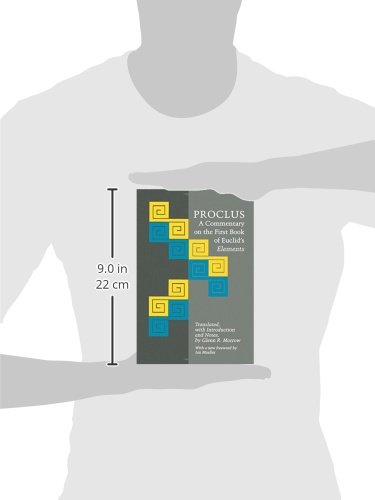



Proclus: A Commentary on the First Book of Euclid's Elements
M**G
Proclus had deep geometric insight
I haven't read all of this book, only the parts relevant to Euclid's parallel postulate. Proclus had the idea for a proof of the latter, based on (A) Aristotle's Angle Unboundedness Axiom, and while that "proof" is flawed, it can be converted to a correct proof if a futher natural geometric hypothesis (S) is added. I will explain this in the forthcoming fourth edition of my text EUCLIDEAN and NON-EUCLIDEAN GEOMETRIES: DEVELOPMENT and HISTORY, where I name the result PROCLUS' THEOREM. It states that assuming Hilbert's axioms of incidence, betweenness and congruence, which fill most (but not all) of the gaps in Euclid, Euclid's Parallel Postulate is logically equivalent to the conjunction of (A) and (S).Proclus was also many centuries ahead of his time in stating publicly that the angle of parallelism might not be a right angle - i.e., recognizing that non-Euclidean geometry might be possible, though he did not pursue that idea.
B**W
Five Stars
A true masterpiece and work of genius.
J**S
Proclus, Euclid and the Platonic Theory of Mathematical Being
Proclus Diadochus (410-485 AD), whose vast literary output covers nearly the whole range of the Late Antique philosophical curriculum, here pays homage to the seminal work of Euclid in his 'Commentary on the Elements.' In addition to being a formal commentary and analysis on the rudiments of Euclid's 'Elements,' Proclus sets forth his philosophy of mathematics, which perhaps is the most important and compelling aspect of this work. Before referring to Proclus' theory of mathematics, it should be mentioned just what the commentator regarded as the meaning and purpose for Euclid's articulation of the 'Elements.' Proclus, in 'Elements' (2.68), states that "Euclid belonged to the persuasion of Plato...and this is why he thought the goal of the 'Elements' as a whole to be the construction of the so-called Platonic figures." These "Platonic figures" alluded to are the five regular solids, the basic cosmic elements, which are a major part of the discussion in the 'Timaeus' concerning the nature of the Demiurge's creation of the cosmos. So, ultimately the question Proclus answers about Euclid's objective for composing the 'Elements' is essentially that the author had in mind the Platonic Forms and the structure of the cosmos, not merely geometrical abstractions in isolation from three-dimensional bodies. We gather from this that Proclus' judgement not only views Euclid as a man of science who composed an introduction to geometry for academic instruction, but also elevates him to the status of a Platonic mystic illuminating cosmological and metaphysical mysteries. With that said, it is likely that Proclus' apotheosis of Euclid is somewhat extravagent and may well be unfounded, but it is very probable that Academic mathematical speculation and the 'Timaeus' text itself had some, if not a cardinal influence in Euclid's thought; and in that regard he may have been a Platonist.Since Proclus sees Euclid as a mystic and a man of science, it is only necessary that his commentary on the 'Elements' reflect that image and be scientific and mystic itself. Just like Euclid's work, Proclus' is intended to be an instructional guide to--and to be an anylasis of--the science of geometry. But beyond the scope of academic formality, a higher goal pervades the entirety of Proclus' commentary; and thus it is requisite to briefly state his theoretical understanding on what the Platonic tradition designates as "mathematicals," or "mathematical being." The supreme principle, the One, is producer of all number via the principles of the Limit and the Unlimited. The Unlimited dynamic unfolds the inexhaustible power of the Infinite, exploding forth in a series of even numbers and is itself the cause the line. The co-ordinate dynamic of the Limit essentially neutralizes the Unlimited's propensity to infinity (which otherwise would proceed unchecked chaotically in an infinite series of even numbers), by offsetting, resovling and bounding the Even with the principle of Odd, which imposes finitely all Form and Order and Stability to the Indeterminate principle; and thus this principle is the cause of the circle. The result of the Limit and the Unlimited's activity is the production of Intelligible Being, known as the One-Being, the first member of the Noetic Triad [=Being, Life, Intellect]. Now, in the One-Being, it is axiomatic to the Platonic system that it possess all Being unitarily and all beings severally, meaning that everything there in the purely incorporeal One-Being is numbered determinately (thus limiting the concept of infinity to potency not actuality) and henceforth produces all number and being in Hypostatic Intellect, in Hypostatic Soul and in the en-Cosmic-Soul and the Cosmos itself. But when speaking of Ideal-Forms, they are not said to possess dimension, but are non-dimensional incorporeal forms; it is the process of projection and extension of the Forms into the Soul where all dimension transpires and is hence simaltaneously the locus for all mathematical being operating in cosmic phenomena. This means that in Proclus' account, "mathematicals" are prior to qualified three-dimensional bodies, as they have an intermediary status between their seat in Intellect and their operation in bodies. Moreover, mathematical being is, in short, co-existent with Soul, as inhering principally in its essence. This is why Proclus considers the whole science of geometry not to be mental abstractions from bodies, but rather as essential components of psychical forms which shape and qualify matter into three-dimensional objects that are only understood through the "eye" of the soul which discerns its own rational-principles and refers these back to the universal Ideal-Forms.Ultimately, Proclus' theory of "mathematicals" is purely Platonic and is, in all probability, Pythagorean. And the idea of mathematical being, as something truly existent, is perhaps the most notoriously anti-Aristotelian doctrine in Platonism. Even though Aristotle did state that mathematics is about first causes, which are themselves divine [Metaphysics VI 1026.1a], he could not elevate numbers themselves to a state of the things that "truly exist" [see his rebuttal of Ideal-Numbers in Metaphysics bk.XIII, ch. 7]. But it is up to intelligent readers and theorists to consider for themselves just what mathematics is and what its relation is to us and the universe. If readers are interested hearing a sublime philosophy of mathematics, the ancient voice of Proclus still has something say in this exegetical tribute to Euclid, which navigates both mystical and scientific number.
J**L
A good English translation of the biggest extant source for the history of Greek mathematics
Proclus's "Commentary on the First Book of Euclid's Elements" is by far the biggest extant source for the history of Greek mathematics. Euclid's Elements has no commentary: Book I starts with the definitions, postulates and common notions, and then states and proves the propositions. There is no discussion about technique or history. Proclus's Commentary has a two part Prologue that has much to say about Platonic, Peripatetic, and allegedly Pythagorean philosophy, and gives a general history of Greek mathematicians. The rest of the Commentary is an item by item discussion of Book I of the Elements. I have consulted the Commentary for what it has to say about Book I proper (particularly those propositions used to prove I.44, on "application of areas"), and Proclus's discussion of Imagination, Limit, Matter, Sensibles, etc. feels occult to me; surely it is valuable for the study of Neoplatonic philosophy, and I imagine that Proclus's detailed proofs later in the Commentary (which are what I as a mathematician care more about) are vice-versa not so useful to historians of philosophy.Because Euclid and generally classical mathematicians did not have a tractable way of talking about the nth case of something for doing induction, propositions about rectilineal figures had to be proved for a putatively typical rectilineal figure. For example, I.45 is about the quadrature of a rectilineal figure and the proof involves triangulating this rectilineal figure. It is merely proved for a 4-gon and there is no discussion in the Elements about what to do for n-gons with n>4. Proclus (382) writes, "Each rectilineal figure is divisible into triangles two less in number than the number of its sides: if it is a four-sided figure, it is divisible into two triangle; if five-sided, into three; and if six-sided, into four." Proclus then justifies this statement, and this passage deserves to be included in any history of complete (=mathematical) induction.As far as I've seen, the largest and most historically and philosophically important works of Proclus are his commentary on Euclid and the following five commentaries, which have all been translated into English and French (unfortunately not yet all into English): There is a translation of "The Elements of Theology" by the celebrated classicist E. R. Dodds, who also wrote the well known "The Greeks and the Irrational". There is a 1970 French translation by Festugière of "Commentaire sur La République". Westerink and Saffrey translated in several volumes "Théologie platonicienne". Morrow also translated "Proclus' Commentary on Plato's Parmenides". Finally Cambridge University Press has in recent years published a translation of "Commentary on Plato's Timaeus", in several volumes by various translators.
G**G
Good translation of Proclus
Proclus was the last major Neo-Platonic philosopher of importance before the Academy was closed by the Christian emperor Justinian in the 6th century. He wrote many works, including long commentaries on Plato's dialogues and a commentary on the Elements by Euclid.This translation by Morrow, a leading Classicist, contains a good introductory essay on Proclus's philosophy of mathematics, along with other scholarly aids such as a biblography. While Proclus's ideas probably have little currency with either philosophers or mathematicians today, they are of interest to the student of Ancient philosophy and the historian of Philosophy.
Trustpilot
4 days ago
1 week ago